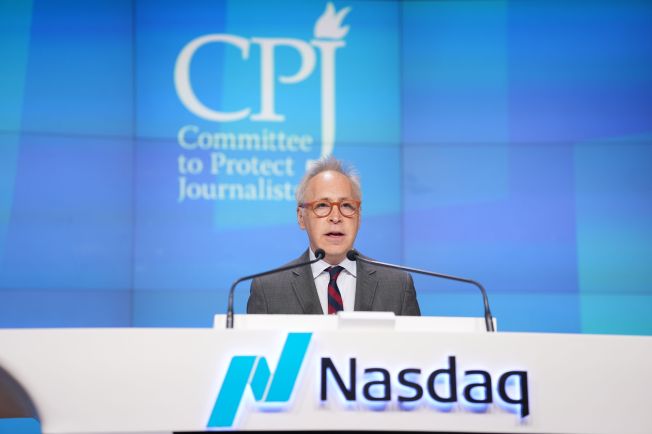The Torch is a weekly newsletter from the Committee to Protect Journalists that brings you the latest press freedom and journalist safety news from around the world. Subscribe here.
As the Israel-Gaza war enters its eighth month, CPJ’s ability to verify attacks on the press has slowed to a crawl. A feature published this week explains why the Israel-Gaza war has become more difficult to document.
An unprecedented number of deaths, with more than 90 Palestinian journalists killed by Israeli forces since the start of the war, displacement, and censorship are all making it exponentially more challenging to confirm information about the war’s devastating impact on Gaza’s media community—and, by extension, the conflict’s broader impact on the region.
“At the start of the war it would take us a day or two to verify information about a journalist who had been killed or injured,” said CPJ Program Director Carlos Martínez de la Serna in New York. “Collecting and vetting this information is now taking us weeks or months, and in some cases won’t be possible at all.”
Amid ongoing challenges to ascertain accurate information in the region, this week Israel’s cabinet voted to shut down Al Jazeera’s operations in Israel, which could set a dangerous precedent for other international media outlets working in Israel.
Read more about CPJ’s documentation of the Israel-Gaza war and the Israeli cabinet’s vote to shut down Al Jazeera.
- Mexican journalist Roberto Carlos Figueroa abducted, killed in Morelos
- Pakistani journalist Muhammad Siddique Mengal targeted, killed by bomb
- Shooter of Philippine journalist Percival Mabasa given up to 16 years jail
- Turkish court sentences journalist Barış Terkoğlu to two years under terror law
- CPJ calls for investigation into Israeli shooting at two Al-Araby TV journalists in West Bank
- CPJ calls for immediate release of Sudanese photographer Abdelaziz Mahmoud Arja
- Jordanian authorities shut down Al-Yarmouk TV station
- SABC editor-in-chief called for security vetting and polygraph before South Africa election
- Nigerian police secretly arrest journalist Daniel Ojukwu over critical report
- Ethiopian journalist Muhiyadin Mohamed Abdullahi sentenced to 2 years in prison
- CPJ, others decry criminal charges against Texas photojournalist Carlos Sanchez
- Pakistani TV anchor Hamid Mir gets death threats after speaking up for press freedom
Spotlight

Last Friday, May 3, marked World Press Freedom Day (WPFD), a day to commemorate and champion the importance of press freedom and freedom of expression worldwide.
In Santiago, this year’s host for UNESCO’s World Press Freedom Day Global Conference, CPJ’s Advocacy and Communications Director Gypsy Guillén Kaiser and Latin America Program Coordinator Cristina Zahar participated in a number of side events.
In Washington D.C., CPJ CEO Jodie Ginsberg spoke on a panel hosted by The Washington Post about the state of global press freedom and the threats to democracy. Furthermore, Ginsberg reiterated the role of a free press in protecting democracies globally in an op-ed published by Project Syndicate and spoke with the Office of the United Nations High Commissioner for Human Rights (OHCHR) High Commissioner Volker Türk about the safety of journalists.
To recognize the occasion in New York, CPJ’s board chair Jacob Weisberg spoke about the importance of the press to democracy, as he rang the opening bell Friday at the Nasdaq MarketSite in Times Square. Separately, CPJ’s Asia Program Coordinator Beh Lih Yi spoke about the record election year and how CPJ is on the frontline to defend journalists at the BBC’s World Service Festival in London.
In addition to commemorating WPFD, CPJ representatives were featured in several news outlets, including the BBC, CNN, The Guardian, and Voice of America.
Finally, CPJ’s emergencies team launched their WhatsApp chatbot to make it easier for journalists to access all of our physical, digital, and psychosocial journalist safety resources.
What we are reading
- Why female journalists don’t stay longer in the newsroom — Sharifah Nambi, Monitor
- Campaigns have a new favorite tactic for dealing with reporters: Public shaming — Evan McMorris-Santoro and Katherine Swartz, NOTUS
- Why Burkina Faso is muzzling foreign media — Kate Hairsine, Deutsche Welle
- Most Americans say a free press is highly important to society — Kirsten Eddy, Pew Research Center
Do you have an Amazon Alexa-enabled device? Enable CPJ's flash briefing skill to stay up to date with the latest press freedom news from around the world.
